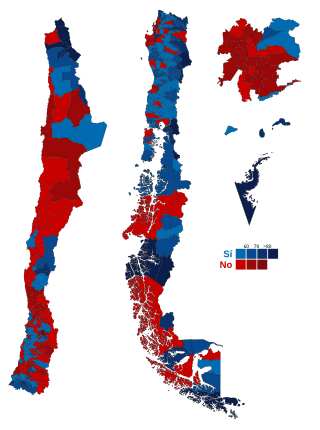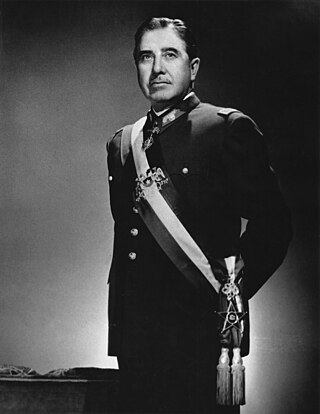
The Argentine War of Independence was a secessionist civil war fought from 1810 to 1818 by Argentine patriotic forces under Manuel Belgrano, Juan José Castelli, and José de San Martín against royalist forces loyal to the Spanish crown. On July 9, 1816, an assembly met in San Miguel de Tucumán, declaring independence with provisions for a national constitution.

The Chilean Civil War of 1891 was a civil war in Chile fought between forces supporting Congress and forces supporting the President, José Manuel Balmaceda from 16 January 1891 to 18 September 1891. The war saw a confrontation between the Chilean Army and the Chilean Navy, siding with the president and the congress, respectively. This conflict ended with the defeat of the Chilean Army and the presidential forces, and with President Balmaceda committing suicide as a consequence of the defeat. In Chilean historiography the war marks the end of the Liberal Republic and the beginning of the Parliamentary Era.
The First Triumvirate was the executive body of government that replaced the Junta Grande in the United Provinces of the Río de la Plata. It started its functions on September 23, 1811, and was replaced on October 8, 1812.

The First Republic of Venezuela was the first independent government of Venezuela, lasting from 5 July 1811, to 25 July 1812. The period of the First Republic began with the overthrow of the Spanish colonial authorities and the establishment of the Junta Suprema de Caracas on 19 April 1810, initiating the Venezuelan War of Independence, and ended with the surrender of the republican forces to the Spanish Captain Domingo de Monteverde. The congress of Venezuela declared the nation's independence on 5 July 1811, and later wrote a constitution for it. In doing so, Venezuela is notable for being the first Spanish American colony to declare its independence.

The First Republic of New Granada, known despectively as the Foolish Fatherland, is the period in the history of Colombia immediately following the declaration of independence from Spain in 1810 and until the Spanish reconquest in 1816. The period between 1810 and 1816 in the Viceroyalty of New Granada was marked by such intense conflicts over the nature of the new government or governments that it became known as la Patria Boba. Constant fighting between federalists and centralists gave rise to a prolonged period of instability that eventually favored Spanish reconquest. Similar developments can be seen at the same time in the United Provinces of the Río de la Plata. Each province, and even some cities, set up its own autonomous junta, which declared themselves sovereign from each other.

The Chilean War of Independence was a military and political event that allowed the emancipation of Chile from the Spanish Monarchy, ending the colonial period and initiating the formation of an independent republic.

The Government Junta of Chile was the military junta established to rule Chile during the military dictatorship that followed the overthrow of President Salvador Allende in the 1973 Chilean coup d'état. The Government Junta was the executive and legislative branch of government until December 17, 1974, when Augusto Pinochet rose was formally declared President of Chile in late 1974. After that date, it functioned strictly as a legislative body until the return to democracy in 1990.

Government Assembly of the Kingdom of Chile, also known as the First Government Gathering, was the organization established to rule post-colonial Chile following the deposition and imprisonment of King Ferdinand VII of Spain by Napoleon Bonaparte. It was the earliest step in the Chilean struggle for independence, and the anniversary of its establishment is celebrated as the national day of Chile.
Government Junta of Chile, also known as the Provisional Junta, was the political structure established to rule Chile following the Military Coup organized by Juan Martínez de Rozas and José Miguel Carrera. It lasted until replaced by the December Junta.

Ignacio de la Carrera y Cuevas (1747–1819) was a Chilean aristocrat, member of the First Government Junta of Chile, and father of the Carrera brothers, who were some of the most important leaders of the early Chilean struggles for independence during the period of the Patria Vieja. Ignacio de la Carrera was of Basque descent.

Government Junta of Chile, was a political structure established during the anarchy that followed the resignation of President Carlos Ibáñez del Campo. It proclaimed the Socialist Republic of Chile. The short-lived state ended with the election of Arturo Alessandri as new president of Chile.

The Socialist Republic of Chile was a short-lived political entity in Chile, that was proclaimed by the Government Junta that took over that year.
Government Junta of Chile, also known as the Executive Junta or the Second Government Junta, was the organ established to rule Chile following the convocatory of a National Congress.
Government Junta of Chile, was the political structure established to rule Chile following a Military Coup organized by José Miguel Carrera. It lasted until replaced by the Superior Governmental Junta.

The Revolutionary Junta of Iquique, was the political structure that was established to challenge the power of Chilean President José Manuel Balmaceda after the navy insurrection that started the 1891 Chilean Civil War. The junta ruled the country until Admiral Jorge Montt assumed power as the new president after Balmaceda's defeat.

A referendum on whether Augusto Pinochet, the head of a military dictatorship, should become president for eight years under resumed civilian rule was held in Chile on October 5, 1988. The "No" side won with 56% of the vote, marking the end of Pinochet's 16-and-a-half-year rule. Democratic elections were held in 1989, leading to the establishment of a new government in 1990.

Augusto José Ramón Pinochet Ugarte was a Chilean military officer and politician who served as Chile's head of state under various titles from 1973 to 1990, first as the leader of the Military Junta of Chile from 1973 to 1981, being declared President of the Republic by the junta in 1974 and becoming the de facto dictator of Chile, and from 1981 to 1990 as de jure president after a new constitution, which confirmed him in the office, was approved by a referendum in 1980. His rule remains the longest of any Chilean leader.

The president of the Chamber of Deputies of Chile is the highest authority of the Chamber of Deputies of Chile. The office was established in 1811 by the First National Congress of Chile.

The Free and Independent State of Cundinamarca was a rebel state in colonial Colombia, replacing the Spanish colonial Viceroyalty of New Granada from 1810 to 1815. It was part of the Foolish Fatherland period at the beginning of the Spanish American wars of independence. Its capital was Bogotá, the former capital of the Viceroyalty of New Granada.
















